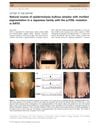 42 citations,
January 2018 in “Expert review of precision medicine and drug development”
42 citations,
January 2018 in “Expert review of precision medicine and drug development” Drug repositioning is becoming more targeted and efficient with new technologies, offering personalized treatment options and growing interest in the field.
 11 citations,
November 2012 in “Seminars in Cutaneous Medicine and Surgery”
11 citations,
November 2012 in “Seminars in Cutaneous Medicine and Surgery” Genetic factors affect hair loss, and molecular testing may help predict, diagnose, and treat it.
[object Object]  13 citations,
September 2002 in “Dermatologic Surgery”
13 citations,
September 2002 in “Dermatologic Surgery” Effective repair of bad hair transplants requires skilled techniques and careful use of donor hair, with strategies like reimplantation and camouflage, and new methods to minimize scarring.
 77 citations,
April 2004 in “Gene expression patterns”
77 citations,
April 2004 in “Gene expression patterns” The three estrogen receptor genes are highly expressed in zebrafish neuromasts during development.
 3 citations,
January 2015 in “Evidence-based Complementary and Alternative Medicine”
3 citations,
January 2015 in “Evidence-based Complementary and Alternative Medicine” Pumpkin seed oil may help hair growth, but more research needed on frontal hair loss and long-term effects.
 3 citations,
August 2019 in “Journal of The American Academy of Dermatology”
3 citations,
August 2019 in “Journal of The American Academy of Dermatology” Higher doses of spironolactone may improve acne in PCOS patients, but side effects are a concern.
 3 citations,
December 2016 in “Canadian Urological Association journal”
3 citations,
December 2016 in “Canadian Urological Association journal” Men with more advanced male pattern baldness have a higher risk of prostate cancer and more severe disease.
 3 citations,
July 2019 in “Experimental Dermatology”
3 citations,
July 2019 in “Experimental Dermatology” Hair loss patients may have different polyamine levels in various scalp areas.
 3 citations,
June 2019 in “Journal of Bangladesh Society of Physiologist”
3 citations,
June 2019 in “Journal of Bangladesh Society of Physiologist” People with hair loss often have lower levels of zinc and copper in their blood.
 3 citations,
July 2013 in “Journal of Cutaneous Pathology”
3 citations,
July 2013 in “Journal of Cutaneous Pathology” A woman's hair loss, resembling an autoimmune condition, improved after treatment, but requires ongoing checks due to potential serious associations.
 3 citations,
January 2020 in “Skin appendage disorders”
3 citations,
January 2020 in “Skin appendage disorders” In Spain, dermatologists most commonly prescribe topical minoxidil and oral finasteride for male hair loss, and topical minoxidil and oral contraceptives for female hair loss. The use of oral dutasteride and oral minoxidil has significantly increased over the past three years.
 3 citations,
April 2019 in “Hormone and Metabolic Research”
3 citations,
April 2019 in “Hormone and Metabolic Research” Women with PCOS have lower adiponectin hormone levels and are more likely to have insulin resistance.
3 citations,
June 2021 in “Frontiers in genetics” The protein STAT3 slows down cell growth by blocking the FST gene, which affects hair development in sheep.
 3 citations,
August 2023 in “Drug safety”
3 citations,
August 2023 in “Drug safety” Proactive monitoring and management are essential to maximize the benefits of Trastuzumab Deruxtecan while minimizing serious side effects.
[object Object]  3 citations,
May 2010 in “Archives of dermatology”
3 citations,
May 2010 in “Archives of dermatology” Herpes zoster infection can cause permanent hair color change in the affected area.
 3 citations,
January 2019 in “Skin research and technology”
3 citations,
January 2019 in “Skin research and technology” All wiping methods are as effective as washing for removing cleaning agent from hair.
 3 citations,
May 2021 in “Molecules”
3 citations,
May 2021 in “Molecules” Rosuvastatin improves lipid levels, reduces inflammation, but worsens insulin sensitivity in men with early-onset hair loss.
 3 citations,
October 2021 in “Indian Journal of Plastic Surgery”
3 citations,
October 2021 in “Indian Journal of Plastic Surgery” Not all hair loss patients are suitable for hair transplant due to various conditions like unstable hair loss, insufficient hair loss, very young age, unrealistic expectations, certain psychological disorders, and medical unfitness.
 3 citations,
December 2019 in “Journal of Cosmetic and Laser Therapy”
3 citations,
December 2019 in “Journal of Cosmetic and Laser Therapy” PRGF treatments increased hair number and thickness in people with hair loss, with more injections leading to better results.
 3 citations,
February 2019 in “Disease Markers”
3 citations,
February 2019 in “Disease Markers” The index to ring finger ratio may indicate disease severity in female ankylosing spondylitis patients, but not in males.
 3 citations,
January 2019 in “Journal of Dermatology”
3 citations,
January 2019 in “Journal of Dermatology” The p.P25L mutation in the KRT5 gene causes a rare skin condition that worsens over time and may lead to hair loss starting in young adulthood.
 3 citations,
August 2018 in “Deleted Journal”
3 citations,
August 2018 in “Deleted Journal” Guasha changed rat skin appearance and blood vessels temporarily without affecting certain nerve proteins or fiber structure.
 3 citations,
January 2024 in “Liver International”
3 citations,
January 2024 in “Liver International” Targeting thyroid hormone receptor α in liver cells may help treat liver fibrosis.
 3 citations,
October 2018 in “Experimental and Therapeutic Medicine”
3 citations,
October 2018 in “Experimental and Therapeutic Medicine” Stopping tamsulosin one month before cataract surgery reduces eye surgery complications in rats.
 3 citations,
January 2014 in “International Journal of Medical Sciences”
3 citations,
January 2014 in “International Journal of Medical Sciences” Mice with human chymase had a higher death rate when exposed to a toxin compared to normal mice.
 3 citations,
March 2007 in “Canadian Medical Association Journal”
3 citations,
March 2007 in “Canadian Medical Association Journal” Women with PCOS should have an oral glucose tolerance test for effective diabetes screening.
 3 citations,
December 2007 in “Injury Extra”
3 citations,
December 2007 in “Injury Extra” An elderly man with dementia suffered limb damage from rubber bands around his leg, highlighting the need for careful monitoring to prevent such injuries.
 3 citations,
September 2006 in “Hair transplant forum international”
3 citations,
September 2006 in “Hair transplant forum international” Transplanting 2,800 to 4,000 hair units closely together is a complex procedure that requires preparation.
 3 citations,
February 2021 in “Medical journal, Armed Forces India”
3 citations,
February 2021 in “Medical journal, Armed Forces India” Combination therapy promotes better hair growth and density.
 3 citations,
January 2019 in “Elsevier eBooks”
3 citations,
January 2019 in “Elsevier eBooks” Pharmacists should interpret lab data and perform physical exams to improve patient care.




























